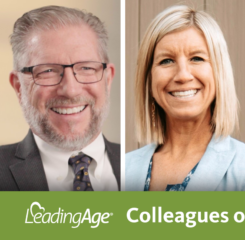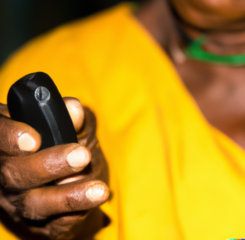Russell Lusak, Chief Operating Officer, Selfhelp Community Services
Russell, thanks for taking time to talk to us today. How about we start by you sharing with us a little bit of about yourself, your career so far, all the way to joining Selfhelp and being the Chief Operating Officer?
Russell Lusak: I’ve been around the block for a while, I’ve been working since 1995 in the healthcare industry. I actually started out working in hospitals with my first job as an Administrative Resident for Mather Memorial Hospital. From there I went on to being the Assistant Administrator for Astoria General in Queens. And then, I began to grow into the long-term care space working for a pediatric nursing home, a geriatric nursing home, and then working in a CCRC (Continuing Care Retirement Community) I also had experience running a Lombardi home care program, which is a nursing home without walls while also overseeing an adult day healthcare program, social adult a program, and a diagnostic and treatment center.
Which brings to me to where I am today, working at Selfhelp Community Services, Inc. where I am the Chief Operating Officer where I am responsible for all of our home and community based services programs. This includes a certified home health agency and a licensed home care services agency. Within these two home care programs, we provide paraprofessional and skilled professional care where our aides, nurses, physical therapists, and social workers provide direct services in people’s homes.
In addition, Selfhelp also has a wide array of services that are community-based. We provide social services in all that we do through our community-based programs. Selfhelp started in the 1930s serving Holocaust survivors and as that population aged, we brought more programs to support them. We later expanded to the broader New York City marketplace serving a diverse clientele.
So today, we have senior affordable housing, four naturally occurring retirement communities, five very active senior centers, two case management programs that provide services in people’s private residences, and then we also have one of the largest community guardianship programs in New York City.
Selfhelp prides itself on bringing services to people through technology. Our affordable housing complexes give us a wonderful opportunity to have a living laboratory allowing us to experiment and play with various technologies. And we’ve been a CAST founding member for almost 9 years. Majd and the CAST crew have been a great partner. They have given us a lot of opportunities to meet new partners and we have along the way.
We developed our own Virtual Senior Center, which has gotten a lot of attention through CAST. The Virtual Senior Center is a way for us to get seniors connected to their loved ones and people they used to be connected with before they were homebound and alone. It was born out of a Senior Centers, where the individual couldn’t make it to the Senior Center anymore, and as a result, we built the Virtual Senior Center for them to participate in the things that they love to do.
So, it was a great solution for us, and we’ve embedded it as part of our Selfhelp innovations where we actually test various in-home devices. For example we’ve experimented with QuietCare which is a remote monitoring system that tracked activities of daily living of people in their apartment. And now we have the Virtual Senior Center.
So, for me personally, I’ve sort of I’ve grown from hospitals and you know I’ve have the full spectrum of the full continuum on how to really take care of people that are either in acute, pre-acute, or chronic stages of a disease.
Healthcare industry as such is going through a lot of change, because of the administration changes, there is a lot of uncertainty in terms of what healthcare is going to look like in the future. How is Selfhelp addressing or looking at this change, and what would be your advice to healthcare executives that are going through this process of change?
Russell Lusak: Pay attention to policy, I mean it’s easy to say it, but to really pay attention to the policy because the small things that you don’t see, they really get you. And Selfhelp has been involved with a lot of policy changes, or we have been in the right places with policy changes in New York State.
We are positioned on statewide committees, and we listen for the little things. And right now for us we are looking at drastic cuts in Medicare and we are assessing the federal government’s policies on block grants and the potential impact it will have in New York State; there could be a major hit of 150-160 million dollars to our sector. So, we are very mindful of what’s happening in the area of policy.
As far as other executives and what they should be paying attention to; the states are changing payment methodologies by moving towards value-based payment, away from fee-for-service, and what’s happening is the ball is moving from institutional care, inpatient setting, into what the hospitals define as an outpatient setting, which is really a euphemism for home care. What the hospitals are looking to do, is to move their patients from their outpatient settings of brick-and-mortar, into the home. They think they can do it quicker by allowing their staff to go into the home and actually visit patients as opposed to partner with post-acute providers who exist in the community; they are trying to replicate what it is that we do already. And I only say that because of the rapport we have with our home and community based clients where we have social workers and nurses who have been working closely with these populations for many years. A seven-day length this day, is not the same as a five-year trusted client relationship. So, I ask my fellow executives, to pay attention to the policies. When considering a buy versus build mentality consider value-based payments and community based partners; you have to pay attention to the policies impacting your operations the most and build greater community partnerships.
For us at Selfhelp we are looking at policy and starting to take a really deep dive in the area of data. You really have to understand the populations that you serve, understand how to identify at-risk populations so that you can put evidence-based programs in place that allows them to stay at home and out of the hospitals.
You’ve been a founding member of LeadingAge CAST. So, what is the value that Selfhelp has derived from its association with CAST?
Russell Lusak: The value we have from CAST are the introductions with technology partners. IBM and Microsoft are examples. In fact, early on with CAST, we met with Microsoft, and they helped us to develop the Virtual Senior Center. They supported our marketing which helped to kick it off. So, I think the value that CAST brings to us is they really have these opportunities to meet with technology professionals, in very intimate settings, so we can really brainstorm and come up with ideas and suggestions that really help the populations we serve.
Russell, obviously you’ve been a very successful executive, chief operating officer and there are a lot of young people that are getting into the industry, looking up to somebody like you, saying how do we become successful like you. What’s your advice to the people that are getting into this industry with ambition?
Russell Lusak: First and foremost, they have to learn policy. They have to learn how our programs operate, because without knowing the construct, it’s very difficult to change. The healthcare industry, is going through a significant transformation. I would say that for people entering this space now they have an advantage that we don’t have. Very early on in their life, they were introduced to technology and grew up playing with it. I have a two-year-old who has been playing with an iPhone and she already understands how to turn it on and actually find ways to get into apps and play.
I think that’s really important to our sector. We need to leverage the technology that exists today and to not reinvent the wheel. Embracing what already exists and finding ways to leverage it and make it work for our sector is key. For example, wearable devices, that technology exists, you can track your pulse and heart rate. How do you take a wearable device and actually move it into the area of prevention? That technology exists and there’s no reason why we can’t do that, and in fact, we’re experimenting with one of our technology partners today.
I also think social media; specifically in the area of a groundswell when people get together very quickly through media outlets is something that is not readily used and understood to the population that I grew up with. I think, social media outlets and social media channels allow you to really mobilize a team of people around policy issues a lot faster. And that’s one thing I think in the area of home and community-based services we can get homebound people to really advocate so they can speak up for what they believe is right. So we are really their voice and unfortunately, we’re a smaller population for that voice making our advocacy on policy issues difficult.
So, I think the younger generation, the young execs coming up, being able to really leverage the technology they grew up in a much different way, would be very advantageous to our space.
This has been a very insightful conversation, thank you so much for sharing so many interesting insights with us. It was a pleasure talking to you.

Most Recommended
April 22, 2024
CMS Finalizes Nursing Home Minimum Staffing Standards
April 21, 2024
 Older Americans Month 2024: Suggested Schedule
Older Americans Month 2024: Suggested Schedule
April 24, 2024
 Colleagues on the Move, April 24, 2024
Colleagues on the Move, April 24, 2024
April 12, 2024
Improving Medicare Advantage
Recently Added
April 25, 2024
Welcome the Newest LeadingAge Members: 1st Quarter 2024
April 24, 2024
 Salary Threshold for White Collar Overtime Exemptions Raised
Salary Threshold for White Collar Overtime Exemptions Raised
April 24, 2024
 Colleagues on the Move, April 24, 2024
Colleagues on the Move, April 24, 2024
April 22, 2024



